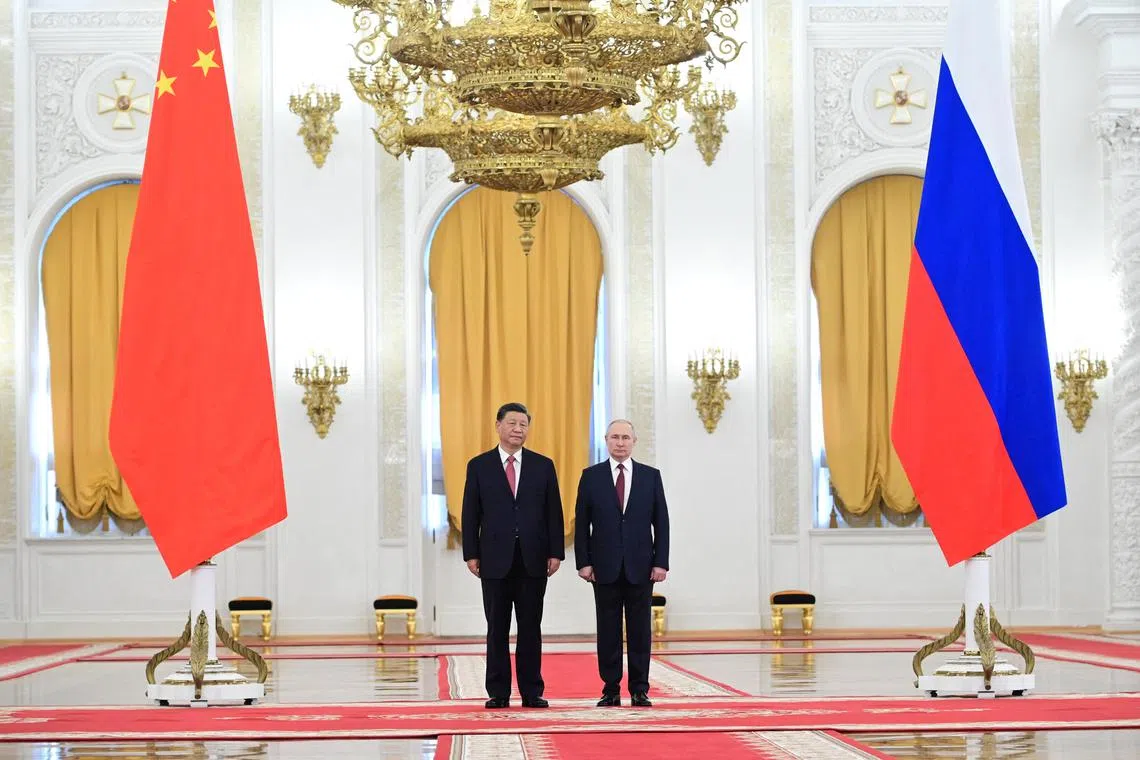Xi Jinping’s Moscow visit: Key takeaways for South-east Asia
The Chinese leader’s visit has brought home some hard truths that will profoundly affect South-east Asia in the years ahead
Sign up now: Get ST's newsletters delivered to your inbox

Chinese President Xi Jinping's visit to Moscow has brought home some hard truths that will profoundly affect South-east Asia in the years ahead.
PHOTO: REUTERS
The world waited with bated breath after Mr Xi Jinping arrived in Moscow this week, hoping the Chinese leader would embark on a constructive peace-making role in the Russia-Ukraine war. But those who had pinned their hopes on Mr Xi exerting pressure on his Russian counterpart Vladimir Putin to reconsider his war plans and withdraw troops from Ukraine were left disappointed. There was no Chinese peace plan offered, nor any clear commitment by the Russians of any deviation from their current course. The focus of Mr Xi’s visit, as it turned out, was more about consolidating the China-Russia anti-Western united front.
The Chinese leader’s three-day visit to Moscow, which ended on Wednesday, has brought home some hard truths that will profoundly affect South-east Asia in the years ahead. Here are key takeaways from Mr Xi’s visit from a South-east Asian perspective.
1. Geopolitics trumps principles
For all its talk about respect for sovereignty and territorial integrity of all nations, it is notable that the 12-point position paper on the Ukraine conflict
The tighter partnership between Beijing and Moscow means that it will be even tougher for Indonesia as current Asean chair to bring the two sides – Russia and China on one and the United States and its allies on the other – within Asean-led mechanisms, especially the East Asia Summit and Asean Defence Ministers’ Meeting-Plus. The duelling between the two blocs could not have been starker this week, with Japanese Prime Minister Fumio Kishida in the Ukrainian capital, Kyiv,
2. ‘Is Ukraine a sovereign state?’
This rhetorical question raised by Chinese scholar Wang Yiwei in a recent interview with The Economist underlines the prevailing view in Beijing that the Russia-Ukraine conflict is a “proxy war” between Nato and Moscow in which Kyiv is but a mere pawn. Beijing has consistently supported and amplified Russian propaganda that blames Nato expansion as the root cause of the conflict.
China’s “proxy war” argument completely overlooks the fact that Ukraine is an independent sovereign state with its own national identity, endowed with legitimate security rights as sacred as those of other nations. The virtual invisibility of Ukraine as a sovereign state in China’s discourse and position about the Russia-Ukraine war should send a chilling message to those South-east Asian countries involved in maritime territorial disputes with China. In fact, a parallel Chinese discourse is at play in the South China Sea, in which Beijing blames all tensions on interventions and incitements by the US and other extra-regional powers. This discourse ignores and suppresses the legitimate concerns of South-east Asian states about Chinese claims and actions that are inimical to their maritime rights and interests in the South China Sea.
3. Junior partner to China
One year after it invaded Ukraine, Russia is now a lesser version of itself, diminished on all fronts. The war has exacerbated the asymmetry in China-Russia ties, with the latter being irreversibly pushed to a “junior partner” status. a critical buyer of Russian hydrocarbons and commodities
A Russia strategically beholden to China will be cause for concern, especially for Vietnam. Prior to the Ukraine conflict, Russia had effectively been straddling between Beijing and Hanoi on the South China Sea dispute. Russia has been Vietnam’s biggest supplier of weapons, especially critical assets like submarines. Russian oil companies have formed longstanding joint ventures with their Vietnamese counterparts to extract hydrocarbons in Vietnam’s exclusive economic zone. These are no longer guaranteed with a weaker Russia stuck in a quasi-alliance with China.
4. Myanmar is a reality check
China’s recent success in brokering the Iran-Saudi Arabia rapprochement
Closer to home for both Asean and China is Myanmar’s ongoing political crisis and civil war between the military regime and the anti-junta movement comprising different ethnic armed organisations, over which China wields considerable influence. While not endorsing the February 2021 coup in Myanmar in the first instance, Beijing has since shifted towards lending some political-diplomatic support to the junta, especially to ensure the continuation of major infrastructure projects under the China-Myanmar Economic Corridor. On Myanmar – just as it is with Ukraine – Beijing has set its aims on securing its narrowly defined geopolitical and economic interests. In the final analysis, anything else could just be a sideshow.
Hoang Thi Ha is senior fellow and co-coordinator of the Regional Strategic and Political Studies Programme at the ISEAS – Yusof Ishak Institute.


